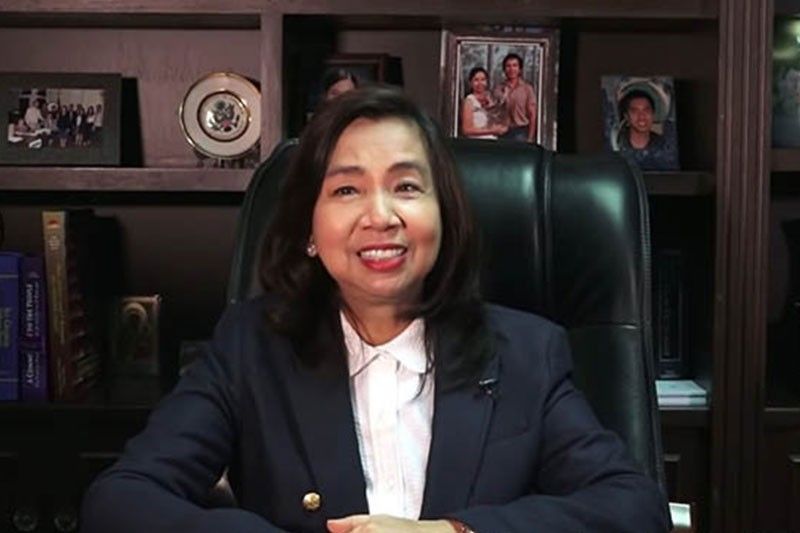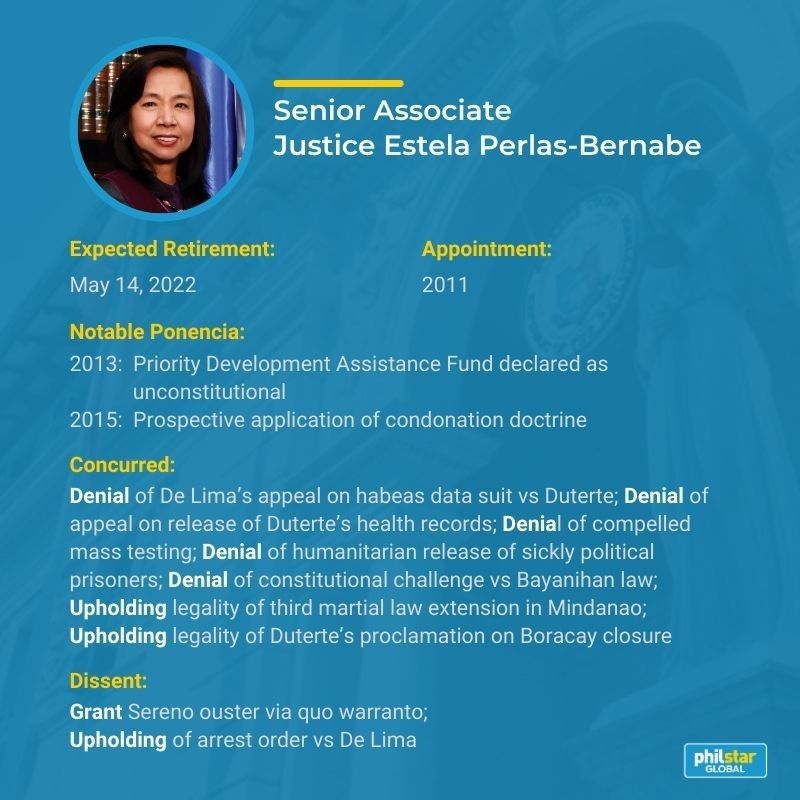#CJSearch: Bernabe says she is a textualist, will be 'judicial activist' only when law is vague

MANILA, Philippines (Updated 1:04 p.m.) — If appointed as the new chief justice, Senior Associate Justice Estela Perlas-Bernabe said she will remain a textualist who will stick to the word of the law if the measure and intent are clear.
But in instances when the assailed law is vague, Bernabe said she would consider becoming a judicial activist. "I can just be a textualist when the law and intent are clear. When the law is vague and intent could not be determined from Framers, I would apply reason, logic and societal implication of ruling and fairness," she said.
Bernabe on Friday was first to face the Judicial and Bar Council public interview for the next chief justice. She is the most senior justice among the three applicants.
FOLLOW: LIVE: Public interview of three chief justice applicants
Judicial activism is defined as the philosophy where a judges depart from strict adherence to judicial precedent for new social policies.
This change of leadership at the SC comes at a time when lawyers are demanding greater action from the judiciary on attacks against the legal profession that claimed more than 50 lives, and when rights groups have been pressing the SC to review its earlier circular on issuance of search warrants—which they claimed have been weaponized against activists and dissenters.
Retired Justice Noel Tijam, a member of the JBC, asked Bernabe whether, if appointed, would she be an activist, reformist chief justice or a moderate, conservative chief justice.
RELATED: Group asks Chief Justice Peralta: Be a humane, more active court
Bernabe replied: “I cannot be a judicial activist, if the law is clear and the intent of the Framers is clear, because I would run contrary to the separation of powers that is going to be considered a judicial legislation."
“But if the law is vague, and the intent is not clear then I can be a judicial activist meaning I could look at the societal implications of the ruling the impacts on society as well as I will exercise reason logic and fairness in my decisions,” she continued.
Judicial legislation is among the issues frequently discussed in the ongoing oral arguments on the 37 petitions against the Anti-Terrorism Act of 2020. No reference however was made to the proceedings since the case is ongoing.
Tijam pressed: How about on cases where the executive branch has duty to protect national security — again, no reference was made but this was also discussed during oral arguments on the anti-terrorism law.
“As chief justice, how should the Supreme Court balance the interest of the executive, expertise on national security matters, vis a vis the judiciary, constitutional duty to enforce the constitution and prevent abuse of power?” he asked.
Bernabe replied: “Insofar as policy matters are concerned, there is somehow a deference to the president's executive power, but we can also check if the exercise of this power is within the bounds of truth and reason.”
Bernabe also said she does not encourage with judicial legislation “because it will breach the principle of separation of powers and I think, for the present, the executive will be mad for us doing that.”
She added that she agrees that judicial legislation may amount to inculpable violation of the Constitution. Asked if this amounts to an impeachable offense, Bernabe said: “In a sense, yes.”
Bernabe stressed that if chosen as chief justice, she will “not only discourage it (judicial legislation) but… prevent it from happening.”
Here are the other questions asked to Bernabe in the public interview:
On reforms in the Judiciary: If appointed, Bernabe would have a little more than a year as chief justice, but she said this is enough time to lay the groundwork for reforms for her successors.
Bernabe said she will push for the full automation of basic court processes and streamlining of internal procedures—including on release of promulgated decision that sometimes take one to two months. She added she will move for the evaluation of the Judiciary’s responsiveness amid public health crisis.
For the “perennial challenge” of court decongestion, Bernabe said she will pursue the full implementation of Judges-at-Large Act and Family Courts Act so that “more judges will be deployed which will expedite the disposition of cases.”
On her type of leadership: “I am a leader by example in the truest sense of the word. My track record would speak for itself that I have been with [Metropolitan trial court] as my first judiciary appointment and I rose up from the ranks to the [Regional trial court] position and now to the SC.”
On SALNs: Bernabe says she agrees with Ombudsman Samuel Martires, also a former justice of the SC, that Statements of Assets, Liabilities and Net Worth of public officials have been weaponized “to a certain extent.”
Bernabe said a person a person may have all qualification of a justice but "the SALN can be used to destroy his reputation and the justice will be so busy defending himself or herself." But there may be times that the SALN can be used to destroy his reputation and the justice will be so busy defending himself or herself.
On PET ruling on Marcos vs Robredo: Bernabe noted that the case involves volumes of records. “I cannot blame the ponente for not deciding it as quickly as possible. This used to be handle by [Associate Justice Alfredo Benjamin Caguioa] passed to [Associate Justice Marvic Leonen] and when it was passed on, he has to review the voluminous records of the case and he has to very careful since it somehow has political color and he was very careful.”
Tijam pressed, but should the petitioner present evidence and if failed, the case should have been dismissed outright? Bernabe said: “Yes an in fact that was what Justice Leonen did in so far as 3rd cause of action is concerned.”
On her most significant ponencias: Bernabe picked her 2013 decision that held that the Priority Development Assistance Funds (PDAF) or congressional pork barrel is unconstitutional and that 2015 ruling that abandoned the condonation doctrine.
“I find these very significant because they changed the landscape of jurisprudence towards strengthening the court’s stance on public accountability,” she said.
On speedy disposition of cases: Bernabe stressed that judges may seek for an extension of period to resolve pending cases. She said judges would be sanctioned if they “concealed the fact that there was delay in the disposition of cases.”
“Everyone can ask, no limit for that extension for as long as you ask for it, and you’re honest to admit you have not complied with the mandatory period,” she added.

- Latest
- Trending































